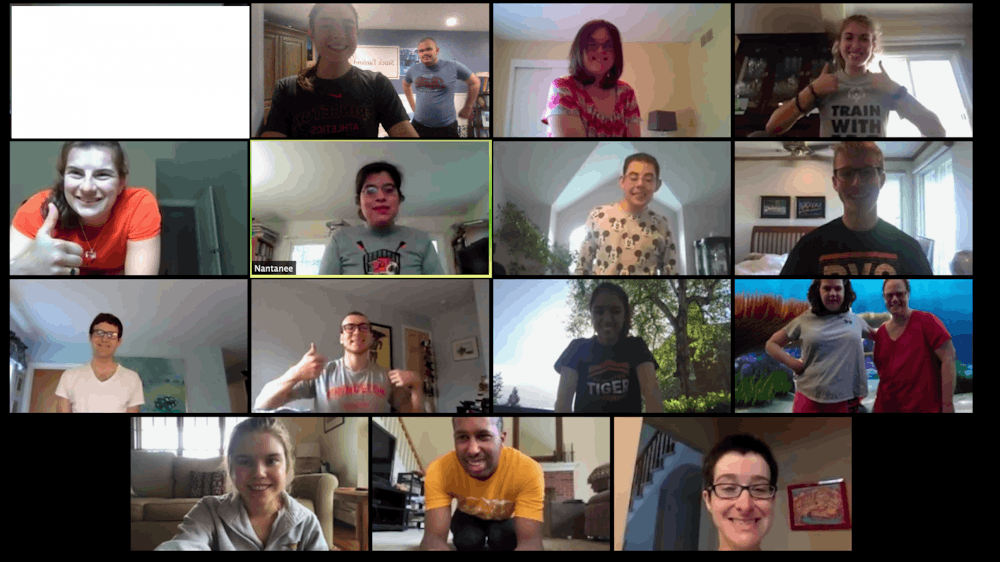In a world without COVID-19, students would be finished with their finals and free to celebrate the beginning of a well-deserved summer vacation. In a world without COVID-19, the memory of fireworks, beer, late nights, and old friends would still be fresh in the minds of the attendees of the Princeton 2020 Reunions. In a world without COVID-19, Princeton musicians such as Ashwin Mahadevan ’22 and Jack Shigeta ’23 would have had a season of spring concerts under their belts, and athletes such as lightweight rower Lauren Sanchez ’21 would have reached the end of their team’s season.
In this alternate world, the 30 athletes who Sanchez helps coach in the Pace Center’s Special Olympics Rowing program would be participating in this summer’s Special Olympics.
So when the student volunteers and Special Olympics athletes both had their seasons canceled, Sanchez realized that now more than ever, they all needed community.
“As socially isolating as this whole experience is for us, it’s much worse for persons with disabilities who are already kind of isolated,” she said.
Normally, the Special Olympics Rowing program runs for an hour every Saturday from September to February; together, the athletes and volunteers make use of the on-campus boathouses’ mechanical rowing machines. Acknowledging that rowing is often expensive and inaccessible, Sanchez loves that the Special Olympics Rowing program allows people with disabilities to participate in a sport to which they otherwise may not have access.
“Opening up collegiate boathouses to communities is a great way to address that problem and share those resources,” Sanchez said.
To keep the Special Olympics athletes and student volunteers in contact with one another during COVID-19, Sanchez organized weekly Zoom workouts every Sunday for the spring semester. On those days, athletes and volunteers alike did an hour-long circuit, complete with a warm-up, dynamic stretching sessions, and body-weight training. Volunteers and athletes split into groups using breakout rooms and trained together.
Like Sanchez, a wide variety of student volunteers recognized the need to reimagine their service this spring. For student volunteers with Trenton Arts at Princeton specifically, the online semester posed a huge challenge.

Before the pandemic, Ashwin Mahadevan ’22 volunteered with the Trenton Youth Singers every Saturday at the Lewis Center for the Arts. As a teaching artist, he would instruct a group of about 25 middle school students from Trenton public schools, rehearse with them, and teach them a variety of musical concepts. They would also simply catch up and chat, using music to bond and foster community.
In a typical year, these hours of rehearsal would culminate in a performance with the Trenton Youth Orchestra in April. Of course, not this spring.
Undeterred, Lou Chen, the program manager for Trenton Arts at Princeton, kept the Trenton students listening to music and in touch. With the help of teaching artists such as Mahadevan, Chen sent out a newsletter filled with exemplary performances to watch, clips of the teaching artists singing together virtually, and links to free recorded or livestreamed concerts every Sunday.
Mahadevan also contributed to the teaching artists’ weekly songs, all of which can be found on the Trenton Arts at Princeton YouTube channel.

“It’s a way to continue doing music and make sure we’re having some impact,” Mahadevan said. “Even if they’re not singing with us, they’re still being exposed to music that they wouldn’t have been exposed to otherwise, which I think is great.”
Initially, Sanchez and her fellow coaches were concerned about how coaching over Zoom would work.
“We were worried that [the sessions] would be difficult because a lot of our athletes are nonverbal and need hands-on corrections, so we asked their parents to be in the room while we had the sessions,” said Sanchez.
But the coaches found ways to improvise and overcome the challenges inherent to online learning, allowing each exercise to be modified to make training more individualized to the athlete’s comfort level.
Although Special Olympics New Jersey (SONJ) has canceled all summer sports until June 30, Sanchez and her fellow coaches are still brainstorming the best ways to support athletes in the fall, regardless of University and SONJ decisions.
Sanchez thinks of these workout sessions as a trial run for alternative programs in the fall, saying that athletes, parents, and volunteers have all loved the online sessions.
“I think it just forces you to reimagine your role and how you want to connect with people,” she said of her experience volunteering during COVID-19.
Another Trenton Arts at Princeton program, the Trenton Youth Orchestra (TYO), adopted a similar weekly newsletter system.
TYO volunteers submitted music recommendations and filmed short tutorials of themselves playing their instruments, so Trenton students could keep orchestra music fresh in their minds and in their ears.
Jack Shigeta ’23 volunteered as a coach and private teacher for the Trenton high school students who participate in TYO. Every Saturday, he used to sit in on rehearsals led by Chen and help students when they broke off into smaller groups. After orchestra rehearsal, Shigeta taught an hour-long private violin lesson.
In addition to the newsletter, Shigeta was able to continue teaching violin lessons over Zoom. While the transition online may have been stressful for some, Shigeta was undaunted.
“My teachers have taught me lessons over FaceTime and Zoom in the past, so I felt confident that this transition would be very smooth,” he said.
Shigeta reported that his lessons went well, expressing that the Trenton high school students appreciated the continuity in teaching as well.
Within the confines dictated by social distancing and shelter-in-place, these student volunteers have stayed true to their goals, working relentlessly to craft meaningful alternatives.
“This whole thing has taught me that volunteering can be done efficiently online,” Shigeta said. “It’s definitely doable and does not need to be sacrificed.”








